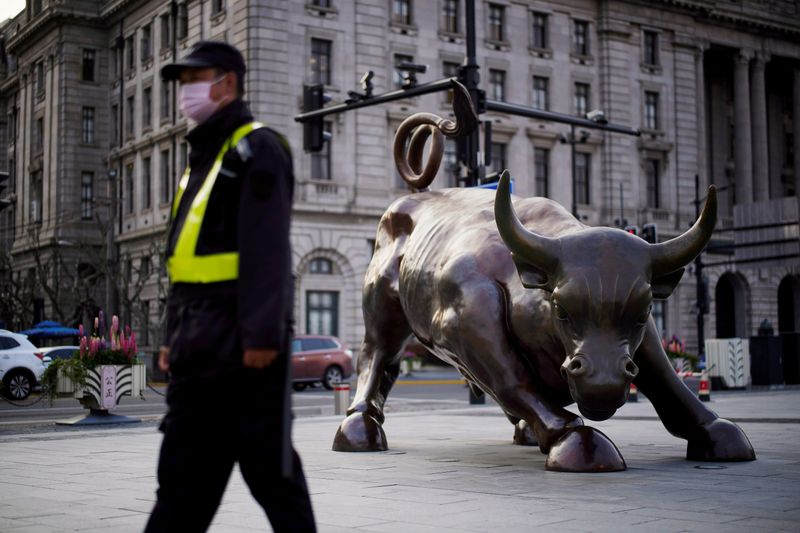Investing.com-- Most Asian markets fell on Tuesday, tracking overnight weakness in Wall Street as strength in the U.S. job market drove bets that interest rates will remain relatively high.
Chinese markets vastly outperformed their peers, rising sharply as trade resumed after a week and as investors reacted to a barrage of stimulus measures from Beijing.
Other Asian markets took a weak lead-in from Wall Street, which fell sharply as traders priced in the prospect of a smaller rate cut in November. U.S. stock index futures were muted in Asian trade.
Asian technology stocks saw the biggest losses on Tuesday, tracking overnight weakness in their U.S. peers amid some regulatory jitters and negative analyst comments.
Chinese markets surge on stimulus cheer
China’s Shanghai Shenzhen CSI 300 and Shanghai Composite indexes rose between 6% and 8% in early trade after opening up as high as 13%.
Trade resumed after the Golden Week holiday, with investors buying into Chinese markets after Beijing announced a slew of major stimulus measures to boost economic growth.
Chinese officials are set to hold a briefing later on Tuesday to outline how they plan to implement more stimulus measures.
Before the Golden Week holiday, the Chinese government had rolled out a string of stimulus measures, including interest rate cuts, smaller reserve requirements for banks, looser property market rules and liquidity measures aimed at the stock market.
Buying into China was also driven by a heavy dose of bargain hunting, given that the country’s benchmark indexes slipped to a seven-month low in September.
But investors were still watching for more stimulus measures in the country, especially targeted fiscal measures.
Asian stocks slip amid rate uncertainty, tech losses
Barring China, broader Asian markets fell on Tuesday, tracking overnight weakness in Wall Street. U.S. stocks fell sharply on Monday as signs of resilience in the labor market- from stronger-than-expected nonfarm payrolls data- fueled bets on a smaller pace of rate cuts by the Federal Reserve.
Losses were largely biased towards technology stocks, especially after U.S. majors Alphabet Inc (NASDAQ:GOOGL), Apple Inc (NASDAQ:AAPL) and Amazon.com Inc (NASDAQ:AMZN) fell on Monday.
Hong Kong’s Hang Seng index slid nearly 4% on Tuesday, amid heavy profit-taking after surging to an over one-year high on optimism over Chinese stimulus measures.
Japan’s Nikkei 225 fell 1.2%, while the TOPIX index shed 1.1%. Data showed some slowing in wage growth in August, but Japanese household spending remained strong, potentially underpinning inflation expectations.
South Korea’s KOSPI lost 0.7%, weighed by a 1.5% decline in Samsung Electronics (LON:0593xq) Co Ltd (KS:005930) after the tech giant forecast a weaker-than-expected third-quarter profit. Samsung rival SK Hynix Inc (KS:000660) fell more than 2%.
Losses in Australia’s ASX 200 index were limited by optimism over China, given its heavy trade exposure to Asia’s biggest economy. Separate data also showed Australian consumer sentiment improved in October.
